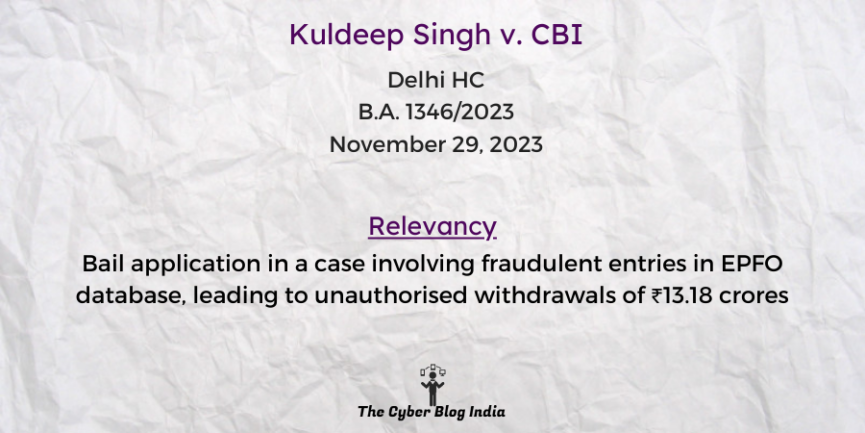Kuldeep Singh v. CBI

Kuldeep Singh v. CBI
In the High Court of Delhi
B.A. 1346/2023
Before Justice Rajnish Bhatnagar
Decided on November 29, 2023
Relevancy of the case: Bail application in a case involving fraudulent entries in EPFO database, leading to unauthorised withdrawals of ₹13.18 crores
Statutes and Provisions Involved
- The Information Technology Act, 2000 (Section 66)
- The Indian Penal Code, 1860 (Section 409, 420, 467, 468, 471, 506, 120B)
- The Code of Criminal Procedure, 1973 (Section 173(8), 439, 482)
- The Prevention of Corruption Act, 1988 (Section 13(2), 13(1)(d))
Relevant Facts of the Case
- ECPO developed software to process the Employees Provident Fund Organisation’s (EPFO) annual accounts. Further, C-DAC established a centralised Unified Portal Application to assist EPFO.
- During the testing on March 14, 2018, Annual Account Team Member Vikram Dattatri reported 25 unauthorised additional members in the EPFO database, leading to wrongful claims settlements worth ₹3.88 crores.
- After that, the matter was reported to Delhi Police, who filed a chargesheet in June 2018.
- The Government of India transferred this matter to CBI. Meanwhile, a supplementary charge sheet was filed under Section 173(8) of the Code of Criminal Procedure, 1973.
Prominent Arguments by the Advocates
- The petitioner’s counsel argued that the police had falsely implicated the petitioner. He cooperated with the investigation, and there is no documentary or oral evidence against him. Moreover, he was willing to return the amount credited to his account.
- The respondent’s counsel highlighted the petitioner’s and his co-accused’s involvement in creating fraudulent entries in the EPFO database. This resulted in a withdrawal worth ₹13.18 Crores in various bank accounts.
Opinion of the Bench
- The bench considered several factors, such as the completed charge sheet, the collection of digital evidence, and the petitioner’s inability to manipulate witnesses or evidence on bail. The court also noted that the co-accused, deemed the main accused, had been granted bail.
- The court stressed the neutral stance on the case’s merits, focusing solely on the bail considerations.
Final Decision
- The court allowed bail application with conditions.
